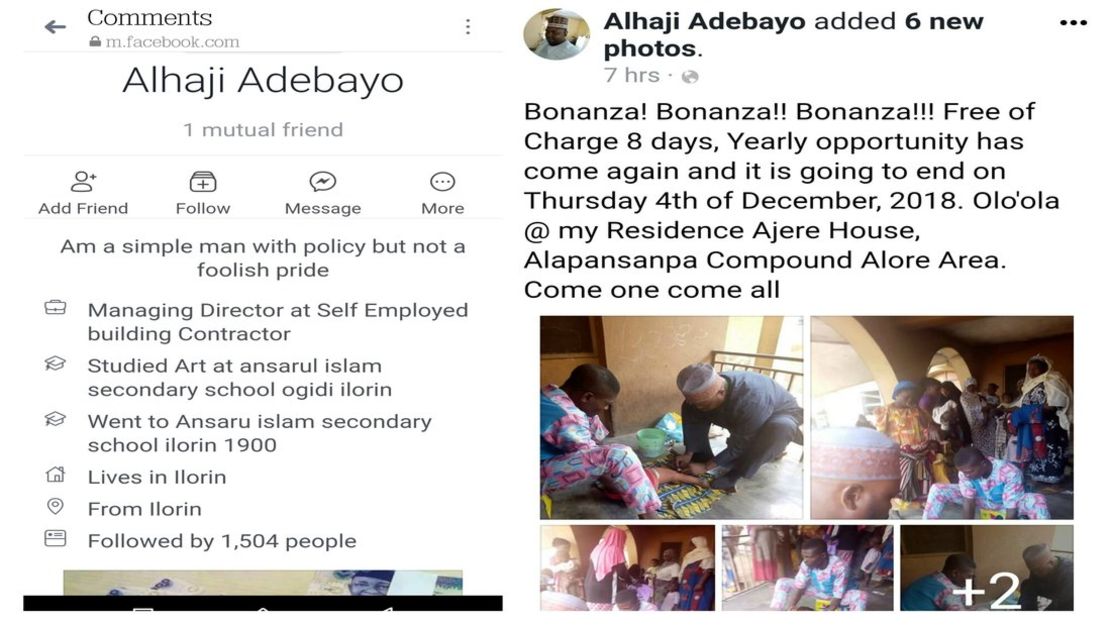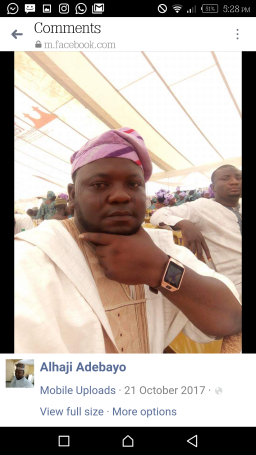Story highlights
A Facebook user in Nigeria posted graphic photos showing children being circumcised and offered free female circumcision at his home
The post has drawn attention to the enforcement of FGM laws in Nigerian states
A Nigerian man has caused outrage after he posted graphic pictures on Facebook showing children apparently being circumcised.
The man, who calls himself Alhaji Adebayo, posted the images on January 3, along with text offering free female circumcision in Ilorin, Kwara State, central Nigeria.
Nigerians left comments criticizing him on social media and urged him to take down the post, which he later did.
Female genital mutilation (FGM) is illegal in Nigeria but there has not been a single conviction, campaigners say.

Adebayo posted on his Facebook page on January 4 that he had been visited by campaigners from anti-FGM groups.
In the post, he said: “They made me realize the disadvantages and implication in doing mutilation for (the) female child.”
“I urge every parent to put an end to the female circumcision…because of (the) problems that might come out from there later in the future,” he added.

Adebayo, who describes himself as a self-employed building contractor, did not respond to CNN’s request for an interview.
One of the anti-FGM campaigners who visited Adebayo told CNN that he was running an unregistered charity which subsidizes male and female circumcision rates for low-income parents. Some of them paid him as little as 500 naira ($1.50), the campaigner said.
Jolaoluwa Aina, of EndCuttingGirls, said: “Most rich people in most families in the area do it for others as a form of charity.
“The ones (cutters) I met had identification cards and belonged to an association.”
Aina also said Adebayo claimed he did not know the practice was illegal and promised to scrap his program.
She added that they visited other local FGM practitioners and informed them about the dangers of cutting young girls.
FGM is recognized internationally as a violation of the human rights of girls and women.
According to the UN, FGM is performed for a number of reasons, including promoting virginity before marriage.
But it can cause severe bleeding and health issues including infections and infertility, as well as complications in childbirth and increased risk of newborn deaths.
In 2015, outgoing Nigerian President Goodluck Jonathan, signed the Violence Against Persons (Prohibition) Bill into law, which included provisions outlawing the practice.
According to the UNFPA, only 10 states in the country have adopted legislation that bans FGM, and Kwara is not one of them.
No convictions
Diene Keita is the UNFPA country representative for Nigeria. She said the organization was working with government and traditional leaders to make sure the laws were being enforced.
There have been no FGM convictions since the law was passed in 2015 and police in Kwara told CNN they are not investigating Adebayo because no one has brought an official complaint against him.
A spokesman for Kwara State Police, Ajayi Okasanmi said: “We’re aware of the Facebook post, and we have told officials of the NGO that complained to put in a petition with evidence.”
“We’re also looking at the law that bans the act,” he added.
A prosecutor with the National Agency for the Prohibition of Traffic in Persons, Obi Agusibio said more education about the dangers of the practice was needed.
He said: “No convictions have been made because only few states have ratified the law. Much advocacy is needed to make people aware of the act.”
A 2017 report by the UN Population Fund estimates that one in four women and girls between the ages of 15 and 49 have undergone FGM in Nigeria.
The report says that the practice has reached alarming rates in six Nigerian states, including Kwara. At 53.3 percent, Kwara State in North Central Nigeria has the sixth highest FGM numbers.
Majority of the initiatives on FGM in Nigeria are spearheaded and funded by NGOs.
However, Nigeria’s First Lady Aisha Buhari, called for the elimination of the practice in the country in 2016.






